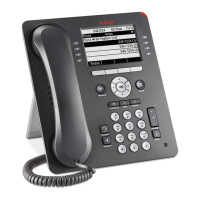Avaya Aura
®
Communication Manager Administration
50 Deskphone SIP 9608, 9611G, 9621G, 9641G Administrator Guide Release 6.0.1
Administering Communication Manager - Common SES/
SM Requirements
Administering RSVP and RTCP/SRTCP
Avaya SIP IP Telephones support the RTP/SRTP Control Protocol (RTCP/SRTCP). The 9600
Series SIP IP Telephones do not support RSVP (Resource ReSerVation Protocol).
Administering QoS
The 9600 Series SIP IP Telephones support both IEEE 802.1D/Q and DiffServ. Other
network-based QoS initiatives such as UDP port selection do not require support by the
deskphones. However, the initiatives contribute to improved QoS for the entire network.
Administering IEEE 802.1D and 802.1Q
The 9600 Series IP Telephones can simultaneously support receipt of packets using, or not
using, 802.1Q parameters. To support IEEE 802.1D/Q, you can administer 9600 Series SIP IP
Telephones by the value of the following configuration parameters:
●
L2Q,
●
L2QVLAN,
●
L2QAUD, and
●
L2QSIG.
Administering DIFFSERV
Type of Service bits 0-5 (also called the Differentiated Services Code Point) are set to the
binary equivalent of the decimal number represented by the value of the following configuration
parameters:
●
DSCPAUD for transmitted audio (RTP, RTCP, SRTP and SRTCP) packets;
●
DSCPSIG for transmitted system-specific signaling packets;
●
Zero for all other transmitted packets (e.g., DHCP, DNS, HTTP, SNMP, etc.).
Received DSCP information will be ignored.

